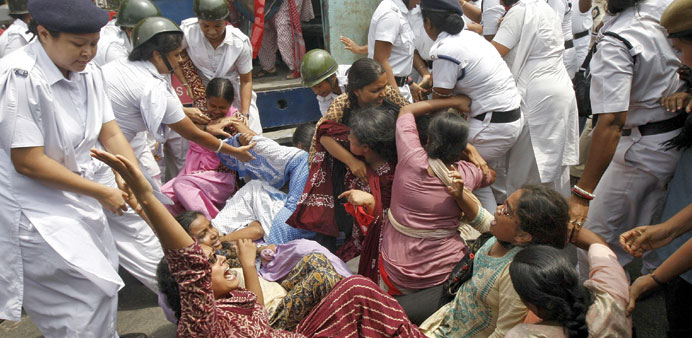AFP/New Delhi
Millions of workers across the country went on strike yesterday in protest at planned labour law reforms, the biggest show of strength by trade unions since Prime Minister Narendra Modi took office.
They say labour reforms planned by Modi’s government will put jobs at risk, and are demanding it scrap changes that would make it easier to lay off workers and shut down unproductive factories.
All India Trade Union Congress secretary Gurudas Dasgupta said the response had been “magnificent” and estimated over 150mn workers participated in the strike, although this could not be independently confirmed.
The strike - the biggest in India for more than two years - included staff at state-run banks and mines as well as some factory, construction and transport workers.
“This strike is a reminder to the government that it must consult the millions of employees (affected) before changing the labour laws,” striking bank worker Amit Khanna said in New Delhi.
Most cities remained peaceful, but clashes between police and activists broke out in West Bengal, which has a long history of left-wing union activism.
Television footage showed police baton-charge protesters in the state capital Kolkata and drag away women strikers who had staged a sit-in, while protesters threw stones and smashed vehicles.
Nearly 200 people were arrested across the state, the Press Trust of India news agency reported.
Banks, shops and other businesses remained closed in the city, stranding commuters and travellers at the main station, while dozens of flag-waving protesters halted suburban trains.
In Delhi, long queues formed at bus stops early yesterday, while passengers were stuck at airports as many taxis and autorickshaws stayed off the streets.
Industry body Assocham estimated $3.7bn in economic losses from the strike, singling out the country’s ports where exports were left lying on the docks.
“Labour reforms are necessary and the government should intervene to come to an agreeable solution in the interest of the industry and the nation as a whole,” Associated Chamber of Commerce and Industry of India general secretary D S Rawat said.
Later yesterday, the government sought to downplay the strike, saying it was “not felt much” in most parts of the country.
However, it stressed its commitment to the welfare of the working classes.
The government has taken “positive steps.... on nine of their twelve demands which will be met as per their aspirations,” it said in a brief statement.
Modi has promised a string of business-friendly reforms to attract foreign investment and revive Asia’s third-largest economy.

Policewomen detain activists from the Socialist Unity Centre of India (SUCI) during a nationwide strike in Kolkata.
